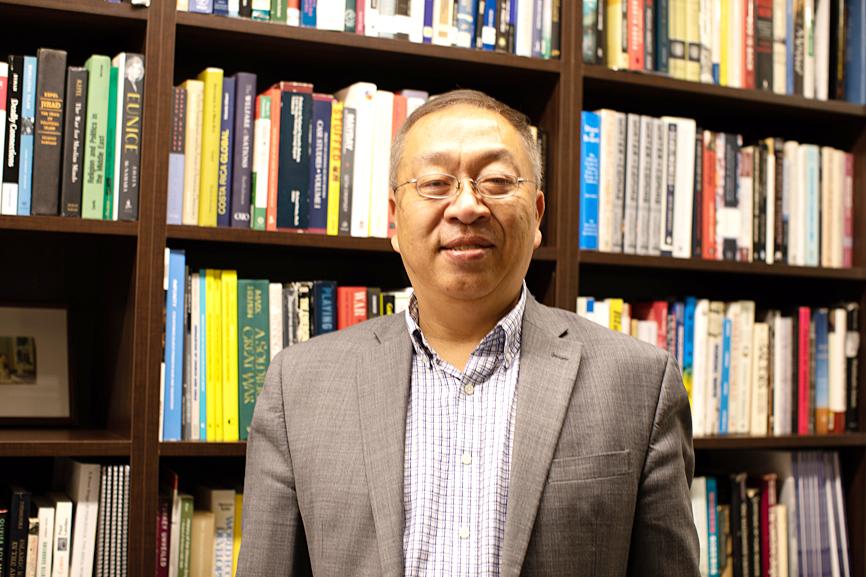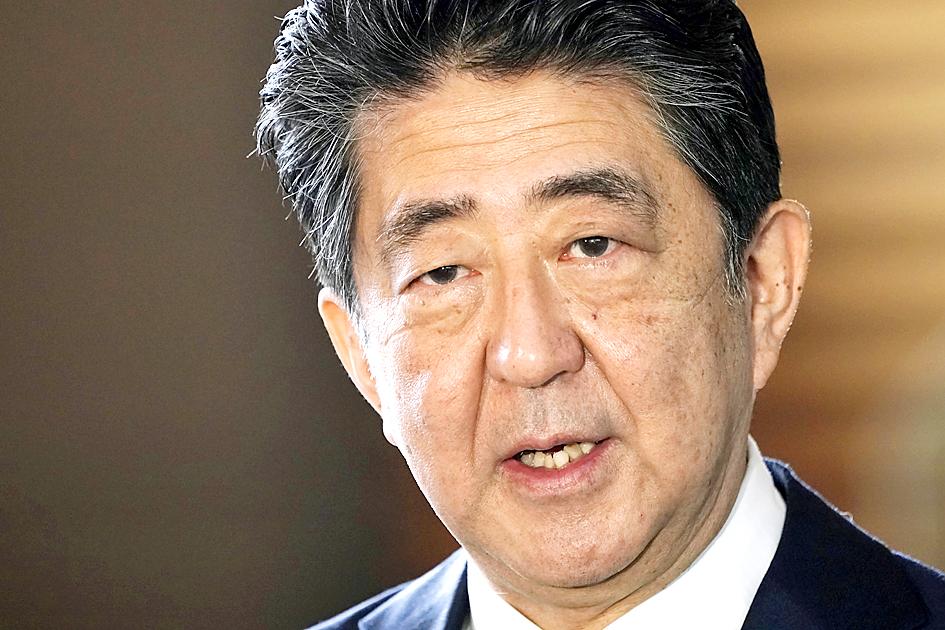The top China adviser to former US secretary of state Mike Pompeo on Saturday said that Taiwan is safer than Ukraine amid growing concern that Russia’s invasion of its neighbor might affect the situation across the Taiwan Strait.
Miles Yu (余茂春), who is now a senior fellow at the Hudson Institute, made the comments in a broadcast interview days before he and Pompeo are scheduled to arrive in Taiwan.
During their visit from Wednesday to Saturday, the two former officials are to meet with President Tsai Ing-wen (蔡英文), as well as other top government and business leaders.

Photo: CNA
Speaking in Chinese with political commentators Wang Hao (汪浩) and Akio Yaita on the Chinese Television System, Yu said that unlike Ukraine, which underestimated Russia, Taiwan is sufficiently wary of Beijing.
Tsai’s government is also strategically aligned with the US and other democracies, making Taiwan “safer than Ukraine,” he said.
Yu said that the US made a “revolutionary leap” in its policy toward the Asia-Pacific region and especially toward Taiwan during the administration of former US president Donald Trump.

Photo: AP
Taiwan is no longer considered just a facet of US-China relations or a small global competitor, he said, adding that the nation now “plays a more prominent role” in global foreign policy.
While it is true that Pompeo was “the most pro-Taiwan” US secretary of state, his sentiment came amid the larger context of US appreciation for Taiwan’s liberal democracy and overall elevation of bilateral relations, he said.
The US believes China harbors a “chain of aggression” toward not only Taiwan, but also Japan, India, Vietnam and other countries around the South China Sea, he said.
“If China is allowed to take a first step, it will inevitably take a second and a third,” he added.
As for Taiwan’s defense, Yu said that its neighbors are all deeply aware of China’s intentions in the wider region and some — including Australia and Japan — have made it clear that they must stand with Taiwan if it faces a military threat.
The US has been even clearer, he added.
From the Indo-Pacific strategy framework and other indications presented by US President Joe Biden’s administration, it is apparent that the new policy direction actualized under Trump has not and cannot be changed, Yu said.
Even in a deeply polarized US Congress, the one issue that enjoys widespread consensus is Taiwan, he said, adding that this kind of architecture would be “hard to change.”
Yu also said that defending Taiwan is the “shared responsibility of democracies,” as allowing Taiwan to fall would pose a threat to democratic nations in Asia and around the world.
Chinese military action against Taiwan would also result in harsher and more effective sanctions, as its economy is more globally integrated than that of Russia, he added.
Yu also commented on the Shanghai Communique, which was signed 50 years ago by then-US president Richard Nixon and Mao Zedong (毛澤東).
Against the background of the Cold War, the two leaders sought to establish a framework for cooperation based on shared interests rather than shared values, he said.
Setting aside incompatible values was a compromise and a gamble, Yu said, adding that this all changed under the last US administration.
The greatest difference is a thorough disappointment with the integrity of the Chinese Communist Party, he said.
As Pompeo has said, the US’ approach to dealings with China should be to “distrust and verify,” Yu said, referring to a reinterpretation of former US president Ronald Reagan’s mantra “trust, but verify” about the Soviet Union in the 1980s.
This is similar to the feeling among Taiwanese, who harbor greater distrust of Beijing than anyone else, he added.
At its essence, the US-China-Taiwan relationship is a struggle between liberal democracy and authoritarianism, “further demonstrating the importance of Taiwan,” Yu said, advocating for the “wholesale abandonment” of the US’ policy of shared interests over shared values.
Separately yesterday, former Japanese prime minister Shinzo Abe in response to fears of a looming Chinese invasion of Taiwan said that a “Taiwan contingency is a Japan contingency.”
In an interview on Japanese television, Abe also called on the US to abandon its strategy of “strategic ambiguity” and declare that it would help defend Taiwan in the event of an attack.
Additional reporting by CNA

The US government has signed defense cooperation agreements with Japan and the Philippines to boost the deterrence capabilities of countries in the first island chain, a report by the National Security Bureau (NSB) showed. The main countries on the first island chain include the two nations and Taiwan. The bureau is to present the report at a meeting of the legislature’s Foreign Affairs and National Defense Committee tomorrow. The US military has deployed Typhon missile systems to Japan’s Yamaguchi Prefecture and Zambales province in the Philippines during their joint military exercises. It has also installed NMESIS anti-ship systems in Japan’s Okinawa

‘WIN-WIN’: The Philippines, and central and eastern European countries are important potential drone cooperation partners, Minister of Foreign Affairs Lin Chia-lung said Minister of Foreign Affairs Lin Chia-lung (林佳龍) in an interview published yesterday confirmed that there are joint ventures between Taiwan and Poland in the drone industry. Lin made the remark in an exclusive interview with the Chinese-language Liberty Times (the Taipei Times’ sister paper). The government-backed Taiwan Excellence Drone International Business Opportunities Alliance and the Polish Chamber of Unmanned Systems on Wednesday last week signed a memorandum of understanding in Poland to develop a “non-China” supply chain for drones and work together on key technologies. Asked if Taiwan prioritized Poland among central and eastern European countries in drone collaboration, Lin

Renewed border fighting between Thailand and Cambodia showed no signs of abating yesterday, leaving hundreds of thousands of displaced people in both countries living in strained conditions as more flooded into temporary shelters. Reporters on the Thai side of the border heard sounds of outgoing, indirect fire yesterday. About 400,000 people have been evacuated from affected areas in Thailand and about 700 schools closed while fighting was ongoing in four border provinces, said Thai Rear Admiral Surasant Kongsiri, a spokesman for the military. Cambodia evacuated more than 127,000 villagers and closed hundreds of schools, the Thai Ministry of Defense said. Thailand’s military announced that

NO CONFIDENCE MOTION? The premier said that being toppled by the legislature for defending the Constitution would be a democratic badge of honor for him Premier Cho Jung-tai (卓榮泰) yesterday announced that the Cabinet would not countersign the amendments to the local revenue-sharing law passed by the Legislative Yuan last month. Cho said the decision not to countersign the amendments to the Act Governing the Allocation of Government Revenues and Expenditures (財政收支劃分法) was made in accordance with the Constitution. “The decision aims to safeguard our Constitution,” he said. The Constitution stipulates the president shall, in accordance with law, promulgate laws and issue mandates with the countersignature of the head of the Executive Yuan, or with the countersignatures of both the head of the Executive Yuan and ministers or